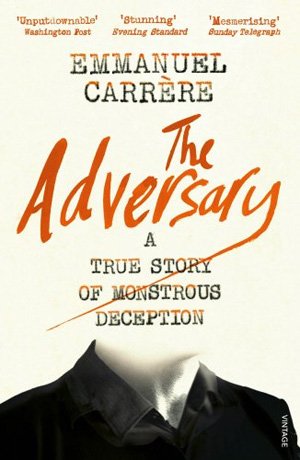 Written by Emmanuel Carrere, translated by Linda Coverdale — This true crime story of deception culminating in murder has fascinated reporters and filmmakers for the past 20 years. Two French films, a Spanish one, a Channel 4 documentary, and several crime shows including Waking the Dead and Law and Order have focused on the story. Author Emmanuel Carrere has probably written the definitive work on the French con-man and murderer Jean-Claude Romand, who killed his wife, their two young children, his parents and their dog in 1993 and tried to set fire to the house to cover his tracks. Carrere’s book, The Adversary, was originally published in 2000 and an English translation followed in 2001, but it has recently been reprinted by Vintage.
Written by Emmanuel Carrere, translated by Linda Coverdale — This true crime story of deception culminating in murder has fascinated reporters and filmmakers for the past 20 years. Two French films, a Spanish one, a Channel 4 documentary, and several crime shows including Waking the Dead and Law and Order have focused on the story. Author Emmanuel Carrere has probably written the definitive work on the French con-man and murderer Jean-Claude Romand, who killed his wife, their two young children, his parents and their dog in 1993 and tried to set fire to the house to cover his tracks. Carrere’s book, The Adversary, was originally published in 2000 and an English translation followed in 2001, but it has recently been reprinted by Vintage.
Jean-Claude Romand was born in 1954 in the Jura mountains. He refused to follow in the family tradition of studying forestry and announced he was going to become a doctor. When he failed to pass his second year exams at medical school in Lyon, he began to lie to everybody around him including his parents and his wife. He never qualified as a doctor but pretended to be a specialist at the World Health Organisation in Geneva, participated in the local community and spent his days studying medical journals and travel guides to maintain his deception. He lived a luxurious lifestyle as befits somebody working for an international organisation, deriving an income by telling friends and relatives he would invest their savings for them in Switzerland.
He kept up this double life for nearly 20 years but first his father-in-law and then his mistress demanded their money back. In danger of being exposed, Romand killed his family and attempted suicide, which Carrere (and the prosecution) believes was deliberately intended to fail. He was finally sentenced to life imprisonment in 1996. Carrere follows the trial and remarks on Romand’s the seemingly utter lack of remorse, but he also tells us Romand’s side of the story and shares the shocked reactions of the man’s friends and neighbours. Although he does not excuse Romand’s behaviour by any means, he is made to feel guilty by the other journalists reporting on the case for glorifying the evil deeds by giving the narcissistic perpetrator the notoriety that he so clearly craves.
Yet that isn’t the impression The Adversary leaves. The author hasn’t just created a factual recreation of events, but is telling a story and highlights and repeats certain moments for greater impact. At its heart it is a powerful meditation on the banal origin of evil. The author fills in gaps with speculation about what might have been going on in Romand’s head. He brings in the religious beliefs of the parents and wife, which might have kept them from questioning things too closely. He wonders how it was possible for Romand to get so carried away with his lies that he believed them himself. Why did he put so much effort into maintaining a deception when he could undoubtedly have qualified in the medical profession for real? How could his family and friends live beside this man for so long and not suspect a thing?
This seems to be the question that most incenses readers, but which does not puzzle me quite as much. Until recently I lived on the very same street where Romand lived and killed his victims. The inhabitants are still traumatised by the events that took place there nearly 25 years ago, and it was especially hard when he became eligible for parole in 2015. Yet they all agree that in that part of France, bordering Switzerland, that it’s very easy to disappear between the cracks. You are living between two countries and their respective laws and tax systems. It is a place where so many people stay on short-term contracts and then move on after two or three years, where high, tax-free salaries are the norm and banks all have wealth management subsidiaries. So it is not all that surprising that Romand gave in to the temptation of a life of ease and status, or that people believed he could access investment options they could not. His wife worked at the local pharmacy and was well liked, the children went to the Catholic school nearby. Romand himself participated in local meetings and seemed knowledgeable about medical subject matters, although he claimed his research interests at the World Health Organisation were too elevated for ordinary GPs to understand. A friend tried to contact him at his place of work, but was told there was no such name on their phone list. He put it down to the fact that Romand was a specialist, possibly working on a freelance contract, and frequently going abroad.
In an era when the term ‘fake news’ is bandied about so much, it is not surprising that this book is back in the bestseller list. It will appeal to fans of emotionally charged literary accounts of true crime by authors such as Helen Garner or Emma Flint. You could also try Denise Mina’s The Long Drop or, of course, Truman Capote’s In Cold Blood.
Vintage
Print/Kindle
£5.49
CFL Rating: 5 Stars









